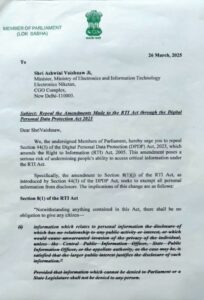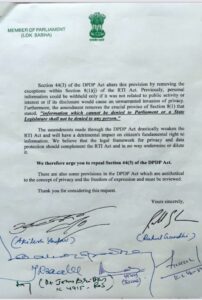On March 26, more than 130 Members of Parliament from the opposition’s INDIA alliance jointly urged Union Minister for Electronics and Information Technology, Ashwini Vaishnaw, to repeal Section 44(3) of the Digital Personal Data Protection (DPDP) Act, 2023. Their appeal comes amid growing concerns that the provision significantly weakens the Right to Information (RTI) Act, 2005—a landmark law that has long empowered citizens to hold the government accountable through access to information.
In their letter to the minister, the MPs warned that this amendment “poses a serious risk of undermining people’s ability to access critical information under the RTI Act.” At the heart of their concern is the change to Section 8(1)(j) of the RTI Act, which originally allowed public authorities to withhold personal information only under specific conditions: if the information had no bearing on public activity or interest, or if its disclosure would result in an unwarranted invasion of privacy.
However, Section 44(3) of the DPDP Act overrides this balanced approach by removing the safeguards and exceptions previously embedded within the RTI framework. Notably, it eliminates the critical proviso that stated: “information which cannot be denied to Parliament or a State Legislature shall not be denied to any person.” This clause served as a vital check to ensure transparency and accountability, even in matters involving personal information.
By exempting all personal data from disclosure without nuance or context, the amendment effectively erodes one of the core principles of the RTI Act—that public interest must prevail over blanket privacy in matters of governance and public life. Critics argue that this change is not just a technical adjustment, but a structural weakening of a law that has empowered journalists, activists, and ordinary citizens for nearly two decades.
The opposition MPs emphasised that any robust data protection framework must work in harmony with the RTI Act, not at its expense. They stated, “We believe that the legal framework for privacy and data protection should complement the RTI Act and in no way undermine or dilute it.
“We therefore urge you to repeal Section 44(3) of the DPDP Act” MPs to Minister
The letter to MeitY Minister can be read here:


Beyond Section 44(3), the letter also flagged broader concerns with the DPDP Act itself. Several provisions, the MPs noted, appear antithetical to the very concepts of privacy and freedom of expression they claim to protect. These, too, must be reviewed to ensure that the Act does not become a tool for opacity or censorship under the guise of data protection.
The letter is signed by Leader of Opposition and Congress MP Rahul Gandhi, Samajwadi Party’s Chief and MP Akhilesh Yadav and other members of parliament.
Information blackout? activists fear section 44(3) of DPDP Act’s impact on RTI
Concerns are mounting among activists regarding Section 44(3) of the Digital Personal Data Protection (DPDP) Act. However, the DPDP Act proposes a simplified clause exempting “information which relates to personal information.”
On the issue, activist Anjali Bhardwaj—known for her work on transparency and accountability—wrote on X that “130+ MPs of the INDIA alliance has written to MeitY Minister, Vaishnaw, to repeal Section 44(3) of the DPDP Act, which amends and severely weakens the RTI law. Hope the govt will take necessary steps to make sure that people’s right to information is not decimated. #SaveRTI”
130+ MPs of the INDIA alliance have written to MeitY Minister, Vaishnaw, to repeal Section 44(3) of the DPDP Act, which amends and severely weakens the RTI law. Hope the govt will take necessary steps to make sure that people’s right to information is not decimated. #SaveRTI pic.twitter.com/oxyKDsMRr4
— Anjali Bhardwaj (@AnjaliB_) April 10, 2025
She also explained how the amendments to the RTI Act were introduced through the Data Protection Law. In another post, she stated that “I explain why we must strongly oppose the changes made to the RTI Act through the Data Protection law. The amendments severely restrict access to critical information & create hurdles in the struggle for accountability”
I explain why we must strongly oppose the changes made to the RTI Act through the Data Protection law. The amendments severely restrict access to critical information & create hurdles in the struggle for accountability.
आरटीआई संशोधन वापस लो ✊🏾#SaveRTI pic.twitter.com/mgy3HQi0XP— Anjali Bhardwaj (@AnjaliB_) March 3, 2025
As reported by The Indian Express, this alteration has sparked worries that the crucial “public interest” test will be eliminated, potentially leading to blanket denials of information vital for transparency and accountability, such as details of public servants’ assets. Leaders like Rahul Gandhi and Jairam Ramesh, along with RTI activists, have voiced strong opposition, arguing that this amendment undermines the fundamental principles of the RTI Act by prioritising privacy over the public’s right to know, even when significant public interest is at stake. They advocate for the repeal of Section 44(3) to safeguard the effectiveness of the RTI Act.
Related
Vacancies, Backlogs, and increased governmental involvement: How the RTI Act has lost its glory!

